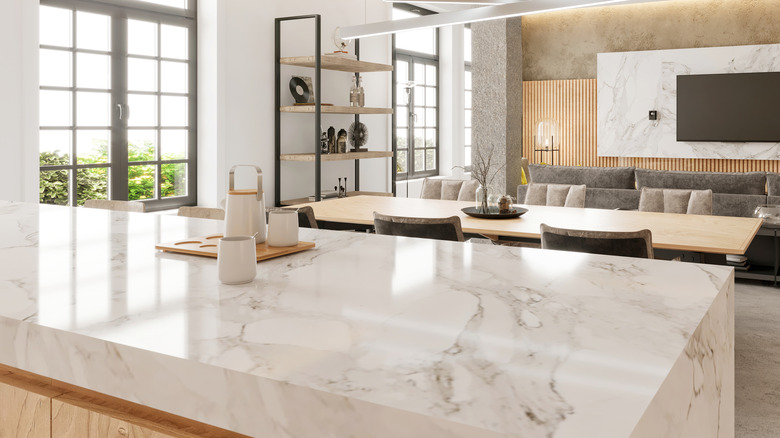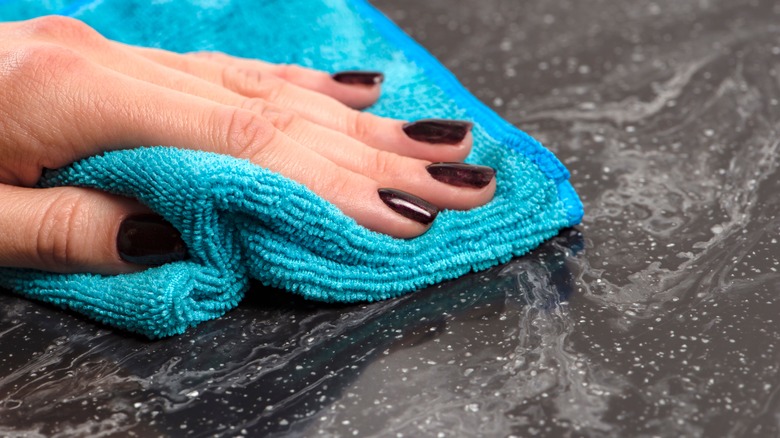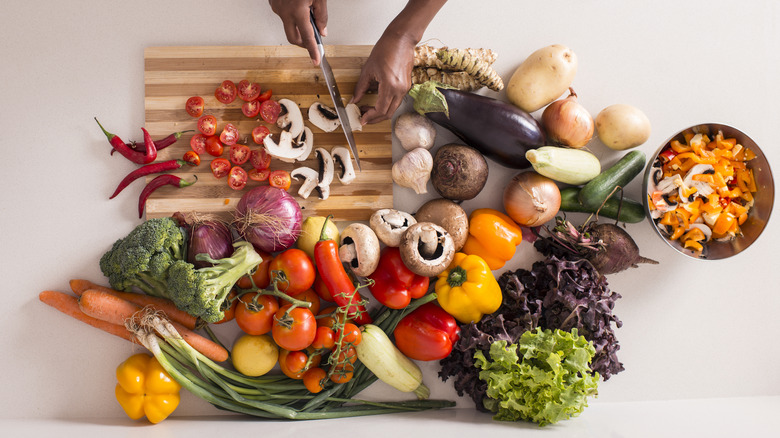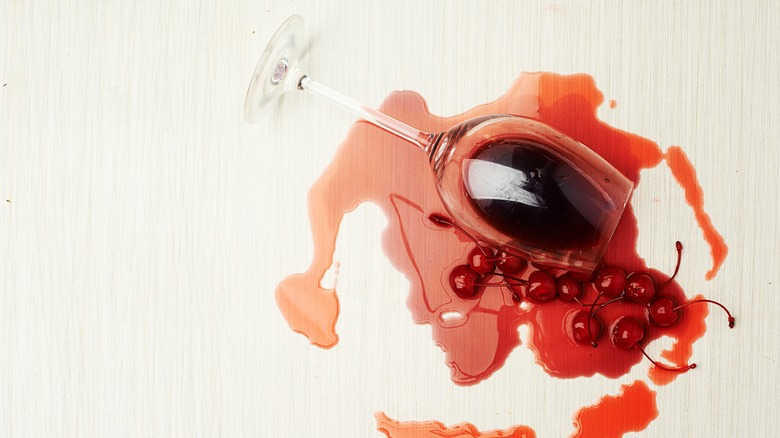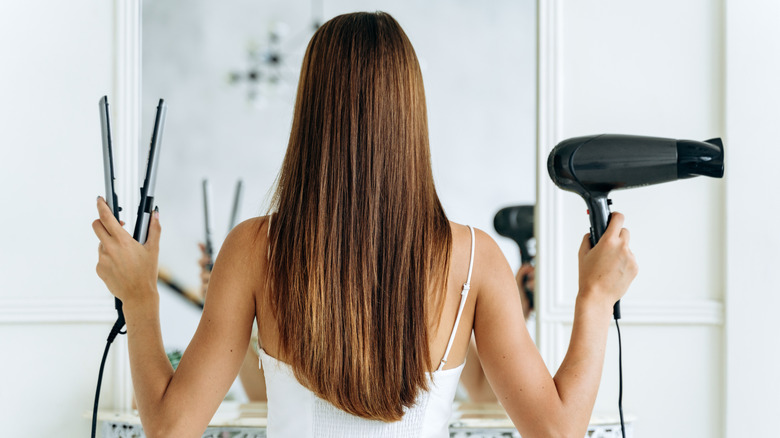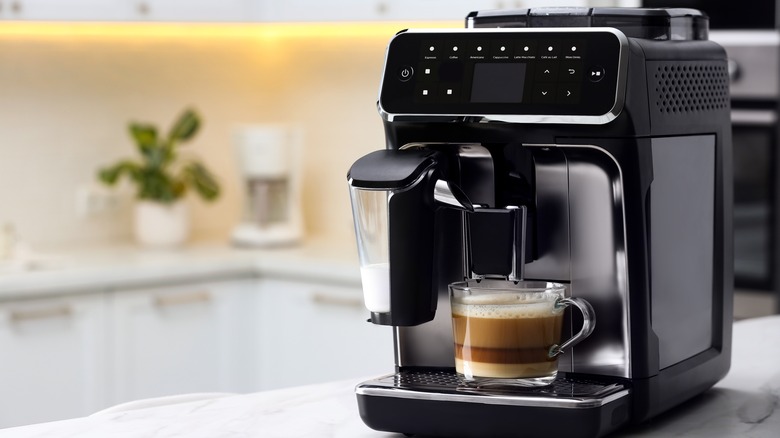Common Mistakes To Avoid If You Have Marble Countertops
While marble countertops can provide a beautiful aesthetic to complete the look in your kitchen, it's important to understand the limitations of this type of stone to avoid causing irreversible damage that may require costly repairs or replacements. Marble countertops are particularly susceptible to damage due to their inherent characteristics. Marble is a natural stone composed mainly of calcium carbonate, which makes it vulnerable to etching and staining. Etching occurs when acidic substances come into contact with the marble surface, causing a chemical reaction that eats away at the stone. Staining can occur when liquids penetrate the porous surface of marble, leaving behind unsightly marks.
Additionally, marble is a relatively soft stone compared to other countertop materials, making it prone to scratches and chips from sharp objects or heavy impacts. Proper care and maintenance, including regular sealing and avoiding harsh cleaning products, are essential to preserve the beauty and longevity of marble countertops. If you are in the market for selecting new countertops and would prefer a more durable material that is resistant to daily wear and tear, there are other options that may be more suitable. Two alternatives are granite countertops and quartz countertops. Granite is a natural stone that is highly durable and heat-resistant, while quartz is an engineered stone that is non-porous, scratch-resistant, and requires minimal maintenance. Quartz countertops are also available in a wider range of colors and designs than either granite or marble, making it a versatile option for your kitchen or bathroom.
Cleaning products to avoid
Marble countertops are a beautiful addition to any kitchen or bathroom, but they require special care to maintain their natural beauty. Using the wrong cleaning products can cause irreversible damage to the porous marble surface. For example, acidic cleaners, such as lemon juice, vinegar, or any products containing citric acid, should never be used on marble countertops. The high acidity of these cleaners can cause etching on the marble surface. Etching appears as dull spots or marks on the countertop, ruining its smooth and polished appearance. The chemical reaction between the acid and the calcium carbonate in marble leads to the erosion of the stone. Instead of acidic cleaners, use a pH-neutral cleaner specifically formulated for marble surfaces. These cleaners are gentle and effective in removing dirt and grime without causing any damage. Mix a small amount of the pH-neutral cleaner with warm water and use a soft cloth to clean the countertop.
Additionally, avoid using abrasive cleaners, harsh chemical cleaners, or scrubbing pads on marble countertops. These products like bleach, ammonia, and steel wool can discolor and scratch the surface of the marble, leaving marks and dulling its shine. Even mild abrasive cleaners, like baking soda or powdered cleansers, can cause damage over time. Instead of abrasive cleaners, opt for a non-abrasive, mild liquid cleaner. Apply a small amount of the cleaner to a soft cloth or sponge and gently clean the countertop in a circular motion. Rinse thoroughly and dry with a clean cloth.
Avoid cutting directly on the counter
Since marble is a soft and porous stone, it is not only susceptible to astringent cleaning solutions, but it's also easily damaged by careless everyday routines in the kitchen or bathroom. For example, cutting or slicing directly on the marble countertop can cause scratches and chips. Sharp objects like knives can easily leave marks on its surface. When you're in a rush or your favorite cutting board is in the dishwasher, it can be tempting to cut directly on the counter to save time or clean up. We're all guilty of hastily slicing a bagel with a butter knife in the morning to shave off a few minutes and get started on our commute. That being said, even one wrong twist of the wrist with a knife in hand can lead to an unsightly blemish in your beautiful counters. To avoid this outcome, it is important to always use a cutting board when preparing food.
In addition to damaging your expensive countertops, cutting food directly on a marble countertop can also damage your knives. Marble is a dense and unforgiving surface, causing blades to dull quickly. Unlike softer cutting boards that absorb some impact, marble doesn't yield, putting excessive stress on knife edges. The constant friction between the hard surface and the blade can lead to chips and nicks. Think of it like slicing through rock, not veggies. To keep your knives in top shape, opt for softer cutting boards like wood or bamboo.
Acidic substances wreak havoc
When you have marble countertops in the kitchen or bathroom, wiping up spills promptly is crucial, especially when dealing with acidic foods or beverages. Acids, found in items like citrus fruits, tomatoes, and vinegar, can etch and stain marble surfaces. In the kitchen, other common acidic culprits include red wine, coffee, and tomato-based sauces. When left unchecked, these spills will penetrate the porous nature of marble, leaving stubborn stains that are challenging to remove without a deep cleaning or sometimes even a professional refinishing service, which can be both inconvenient and costly. If left alone, these acidic substances can also seep into the marble, causing discoloration.
While the kitchen is a high traffic area for acidic substances, in the bathroom, products like perfumes, toiletries, and even toothpaste may contain acids that can harm the marble surfaces. Prevention is key, and avoiding prolonged exposure of acidic materials to marble is the first line of defense.
To minimize the risk of stains, it's best to use cutting boards, coasters, and trivets. When spills occur, immediately blot the affected area with a soft, damp cloth to prevent the acidic liquid from seeping into the pores. Opt for a pH-neutral stone cleaner and gently wipe the surface. Periodic sealing of marble countertops creates a protective barrier, enhancing resistance to stains. Regular maintenance, cautious usage, and swift cleanup are the keys to preserving the pristine allure of marble countertops in both the kitchen and bathroom.
Marble is sensitive to extreme temperatures
When it comes to marble kitchen countertops, avoid subjecting them to extreme temperatures. Marble, being a natural stone, has a crystalline structure that is sensitive to sudden temperature changes, making it susceptible to damage. Placing extremely hot pots or pans directly on the surface can lead to thermal shock, causing cracks or fissures in the marble. This not only compromises the aesthetics but also undermines the structural integrity of the countertop. To mitigate this risk, it's advisable to use hot pads or coasters for hot dishes, providing a protective barrier and preventing direct contact between the extreme temperatures and the marble. Regularly sealing the marble also adds an extra layer of protection, enhancing its resistance to temperature-induced damage.
The same is true for marble countertops in the bathroom. These countertops face a different set of challenges, especially with extremely hot items like hair styling tools. The intense heat emitted by tools such as hair straighteners or curling irons can have the same adverse effects on marble surfaces. Prolonged exposure may result in discoloration, dullness, or even the development of small cracks. To avoid such issues, it's wise to use heat-resistant mats or place a towel underneath hot styling tools when not in use. This precautionary measure acts as a buffer, preventing direct contact between the hot tools and the marble countertop. Incorporating these practices into your daily routine ensures the longevity and pristine appearance of your marble surfaces in both the kitchen and bathroom.
Avoid excessive weight
Marble countertops are sensitive to heavy items due to the nature of the material. The structure of marble makes it susceptible to cracking or breaking under excessive weight. In both the kitchen and bathroom, it's essential to be mindful of what heavy items are placed on marble surfaces to avoid potential damage. Common heavy items in the kitchen include large cooking appliances, like blenders or stand mixers, as well as cast iron cookware. In the bathroom, items like ceramic jars, heavy beauty product containers, or even electronic devices can pose a risk. Placing such hefty items directly on marble countertops can lead to surface damage, including cracks or chips, compromising both the aesthetics and functionality of the countertop.
To prevent these issues, consider using cutting boards or trivets for heavy kitchen appliances and cookware. In the bathroom, opt for shelves or organizers to distribute the weight more evenly. Avoid dragging heavy items across the marble surface to minimize the risk of scratches or cracks. If you anticipate needing a countertop that can withstand heavier items without sacrificing aesthetics, materials like granite or quartz are excellent alternatives to marble. Both are known for their durability and resistance to scratches, heat, and weight. Granite, with its natural strength, is particularly suitable for heavy-use kitchens, while quartz, being an engineered stone, offers both durability and a wide range of design possibilities. These alternatives provide a balance between functionality and style, ensuring your countertops can handle the demands of everyday use.
